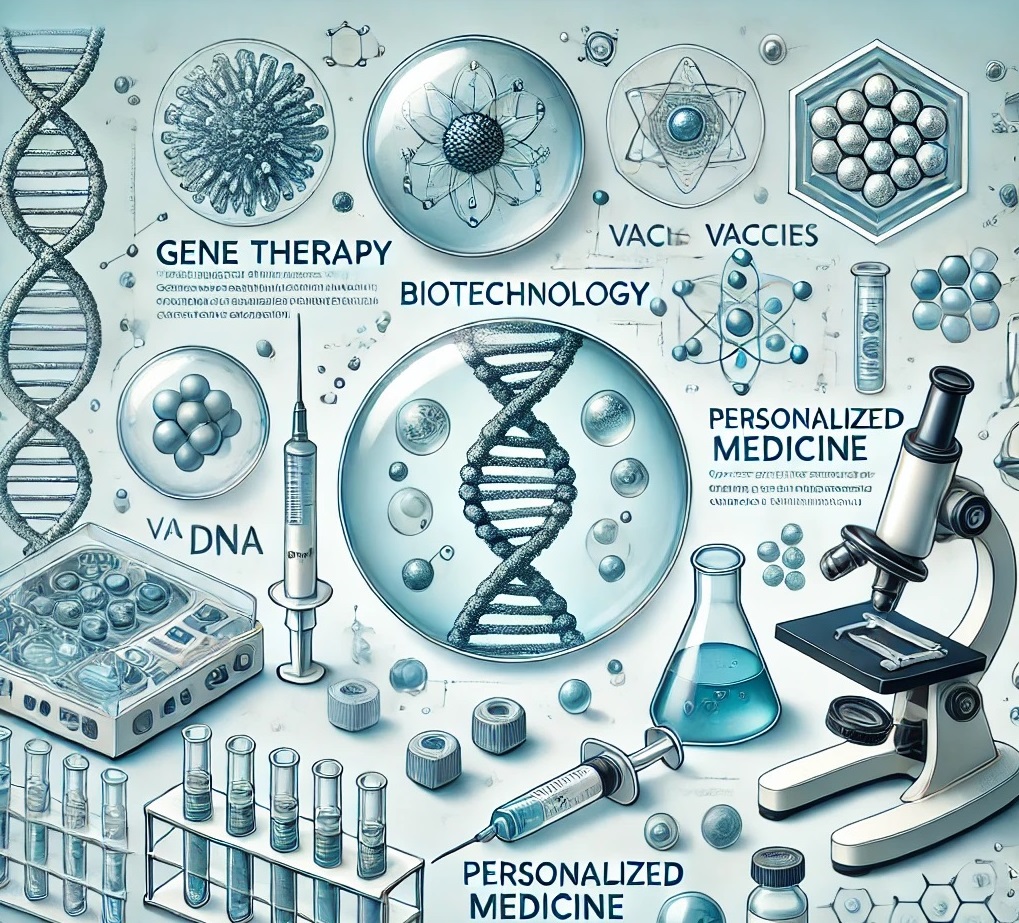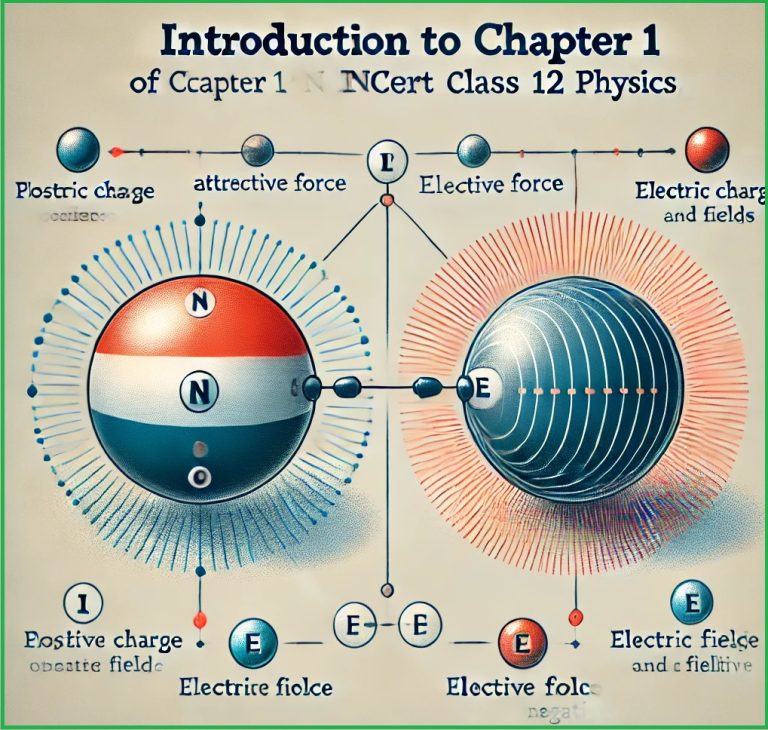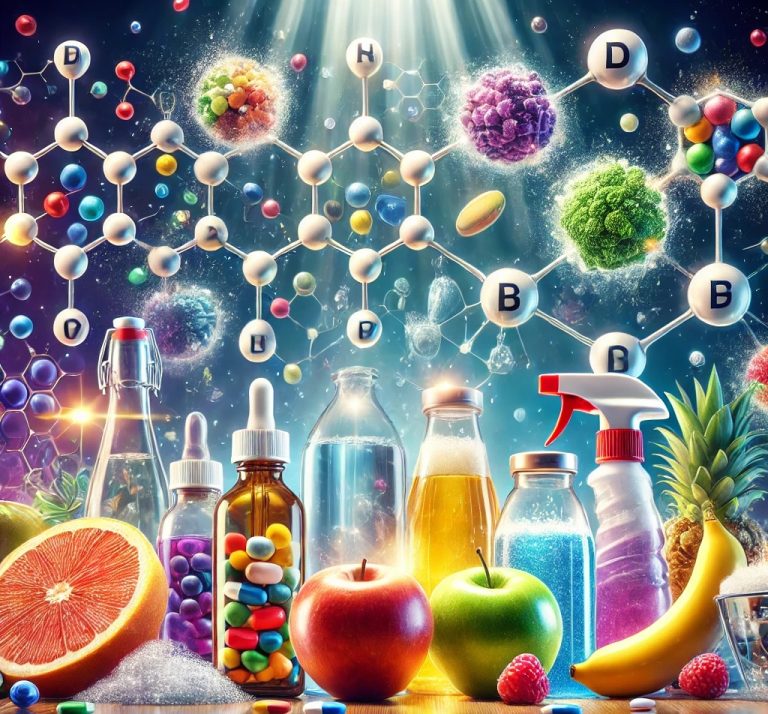
Biotechnological Applications in Medicine
Biotechnology has had a transformative impact on the field of medicine, revolutionizing the way diseases are diagnosed, treated, and prevented. From the production of life-saving drugs to gene therapy, biotechnology has opened new frontiers in medical research, clinical practice, and the development of innovative treatments. This interdisciplinary science, which combines biology, technology, and medicine, has contributed immensely to improving human health by offering more precise, personalized, and effective medical interventions.
In this essay, we will explore the various biotechnological applications in medicine, including the development of biopharmaceuticals, gene therapy, genetic testing, stem cell therapy, diagnostics, and personalized medicine. Additionally, we will examine the challenges and ethical considerations surrounding these advancements.
1. Biopharmaceuticals and Recombinant DNA Technology
Biopharmaceuticals, also known as biologics, are drugs that are produced using living organisms. The development of biopharmaceuticals is one of the most significant applications of biotechnology in medicine. Unlike traditional chemical drugs, which are synthesized using chemical reactions, biologics are produced by genetically modified organisms (GMOs), including bacteria, yeast, and mammalian cells, that express therapeutic proteins.
a) Insulin Production
One of the earliest and most successful applications of recombinant DNA technology is the production of human insulin. Before biotechnology, insulin was extracted from animal pancreases, but this process was inefficient and sometimes led to allergic reactions in patients. With recombinant DNA technology, scientists inserted the human insulin gene into Escherichia coli (E. coli) bacteria, allowing these bacteria to produce large quantities of human insulin. This innovation made insulin production more reliable, cost-effective, and safer for diabetic patients.
b) Monoclonal Antibodies
Monoclonal antibodies (mAbs) are another crucial class of biopharmaceuticals. These are antibodies that are identical and produced from a single clone of a B cell, designed to target specific molecules or cells. Monoclonal antibodies have revolutionized the treatment of diseases such as cancer, autoimmune disorders, and infectious diseases. For example, the monoclonal antibody Rituximab is used in the treatment of certain types of cancer like non-Hodgkin lymphoma, while Herceptin targets HER2-positive breast cancer cells. The development of monoclonal antibodies has provided new, targeted treatments for previously difficult-to-treat diseases.
c) Vaccines
Biotechnology has also been pivotal in the development of vaccines. Vaccines are biologically derived products that stimulate the immune system to protect against specific diseases. Biotechnology allows for the production of vaccines in a more controlled and efficient manner. For example, the Hepatitis B vaccine is produced using recombinant DNA technology by inserting the viral gene into yeast cells, enabling the yeast to produce viral proteins that are used in the vaccine. The development of mRNA vaccines, such as the Pfizer-BioNTech and Moderna COVID-19 vaccines, is another groundbreaking application of biotechnology, using messenger RNA to instruct cells to produce a harmless spike protein that triggers an immune response.
2. Gene Therapy
Gene therapy is a revolutionary medical treatment that involves the insertion, alteration, or removal of genes within an individual’s cells to treat or prevent disease. It holds the potential to cure genetic disorders by directly addressing the root cause: faulty or missing genes.
a) Gene Editing Technologies (CRISPR-Cas9)
One of the most promising advancements in gene therapy is the development of CRISPR-Cas9, a gene-editing tool that allows for precise modifications to the DNA of living organisms. By harnessing the power of CRISPR, scientists can target specific genes, either repairing them, turning them on or off, or introducing new genes into the genome. This technology has already shown promise in treating genetic disorders such as sickle cell anemia and cystic fibrosis. Researchers have been able to correct mutations in the DNA of patient cells outside the body, which are then reintroduced to potentially treat the disease. While still in the experimental stages, CRISPR-Cas9 is considered a breakthrough in the treatment of genetic disorders and offers great hope for curing previously untreatable diseases.
b) Ex Vivo and In Vivo Gene Therapy
Gene therapy can be performed in two main ways: ex vivo and in vivo.
- Ex vivo gene therapy involves removing cells from the patient’s body, modifying them outside the body, and then reintroducing them. For example, bone marrow cells can be removed from a patient with a blood disorder, genetically modified to express a functional gene, and then reintroduced to treat the disease.
- In vivo gene therapy involves directly delivering genetic material into the patient’s cells in the body. This is typically done using viral vectors or nanoparticles to deliver the genes to the target cells.
Gene therapy offers the potential for curing genetic diseases, improving immune system function, and providing new treatments for cancer by enhancing the body’s ability to fight cancerous cells.
3. Stem Cell Therapy
Stem cell therapy involves using undifferentiated cells to treat a wide range of medical conditions. Stem cells have the unique ability to differentiate into many different types of cells, making them invaluable in regenerative medicine.
a) Types of Stem Cells
There are two primary types of stem cells used in therapy:
- Embryonic stem cells: These are pluripotent cells derived from embryos, capable of developing into any type of cell in the body. However, their use raises ethical concerns due to the destruction of embryos.
- Adult stem cells: These are multipotent cells found in various tissues of the body, such as bone marrow and adipose tissue. Adult stem cells are less controversial and have shown potential for use in treating diseases like Parkinson’s disease, heart disease, and spinal cord injuries.
b) Applications of Stem Cell Therapy
Stem cells can be used to repair or replace damaged tissues and organs. For example, bone marrow transplants have been used for decades to treat leukemia and other blood disorders. Additionally, stem cells are being explored for their potential in repairing damaged heart tissue following heart attacks, regenerating neurons in conditions like Alzheimer’s and Parkinson’s diseases, and repairing spinal cord injuries.
In the future, stem cell therapy could be used to create entire organs for transplantation, which would alleviate organ shortages and eliminate the need for organ donors.
4. Genetic Testing and Diagnostics
Genetic testing, a crucial application of biotechnology, involves analyzing an individual’s DNA to detect genetic mutations or predispositions to certain diseases. This can help in diagnosing genetic disorders, predicting disease risk, and tailoring personalized treatments.
a) Prenatal Genetic Testing
Prenatal genetic testing allows for the detection of genetic disorders in a fetus before birth. Tests like amniocentesis and chorionic villus sampling (CVS) can detect conditions such as Down syndrome, cystic fibrosis, and sickle cell anemia. Newer non-invasive tests that analyze fetal DNA circulating in the mother’s blood can also be used for early detection of genetic disorders, providing a safer alternative to traditional methods.
b) Cancer Diagnostics
Genetic testing plays a significant role in the early detection of cancers. By identifying specific genetic mutations, doctors can detect cancers at an early stage, even before symptoms appear. Genetic testing can also be used to identify individuals at higher risk for certain types of cancer, enabling personalized surveillance and prevention strategies. For example, testing for mutations in the BRCA1 and BRCA2 genes can help assess the risk of breast and ovarian cancers, allowing for early intervention or preventive measures.
c) Pharmacogenomics
Pharmacogenomics is the study of how genetic variations affect an individual’s response to drugs. By analyzing a person’s genetic makeup, doctors can predict which medications will be most effective and which ones may cause harmful side effects. This personalized approach to prescribing medication can improve treatment outcomes, reduce adverse drug reactions, and optimize drug dosages.
5. Personalized Medicine
Personalized medicine, also known as precision medicine, is an approach that uses genetic, environmental, and lifestyle information to tailor medical treatment to an individual’s specific characteristics. Rather than a one-size-fits-all approach, personalized medicine considers the individual’s genetic makeup to predict how they will respond to a treatment.
a) Targeted Therapies
Targeted therapies are designed to specifically target the molecular mechanisms underlying diseases, particularly cancer. By analyzing the genetic mutations present in a patient’s tumor, doctors can select treatments that specifically target those mutations. For example, targeted therapies for breast cancer often focus on the HER2 receptor, which is overexpressed in certain forms of breast cancer. This personalized approach leads to more effective treatments with fewer side effects compared to traditional chemotherapy.
b) Biomarkers
Biomarkers are molecules that indicate a particular disease state, and they play a critical role in personalized medicine. By identifying and analyzing biomarkers in the blood, urine, or other tissues, doctors can diagnose diseases earlier, predict disease progression, and monitor the effectiveness of treatment. Biomarkers are particularly useful in cancer treatment, where they help guide decisions about the use of chemotherapy, immunotherapy, or other therapies.
6. Challenges and Ethical Considerations
Despite the numerous benefits, biotechnological applications in medicine present several challenges and ethical considerations:
- Ethical concerns in gene therapy: Gene editing, especially germline editing, raises questions about the potential for “designer babies,” where genetic traits may be chosen for non-medical reasons. There are concerns about unintended consequences and the long-term effects of genetic modifications.
- Cost and accessibility: Biotechnological treatments such as gene therapy and personalized medicine are often expensive, making them less accessible to individuals in low-income
10 Questions Answers related to Biotechnological Applications in Medicine
1. What is biotechnology, and how is it applied in medicine?
Answer:
Biotechnology is a field of science that uses biological systems, organisms, or derivatives to develop or create products that can improve human health. In medicine, biotechnology is applied to create biopharmaceuticals, gene therapies, diagnostic tools, and personalized medicines. Biotechnology enables the production of vaccines, insulin, monoclonal antibodies, and the development of gene editing technologies like CRISPR, all of which have significant therapeutic applications. It has revolutionized medical treatments, enabling precise and personalized interventions.
2. How does recombinant DNA technology benefit the production of insulin?
Answer:
Recombinant DNA technology has significantly improved insulin production. Before biotechnology, insulin was extracted from animal pancreases, which was inefficient and sometimes caused allergic reactions in patients. By using recombinant DNA technology, the gene for human insulin is inserted into E. coli bacteria, which then produces human insulin. This method is more reliable, cost-effective, and reduces the risk of allergic reactions, ensuring a consistent supply of insulin for diabetic patients.
3. What are monoclonal antibodies, and how are they used in medical treatments?
Answer:
Monoclonal antibodies (mAbs) are laboratory-made molecules designed to mimic the immune system’s ability to fight off harmful pathogens. These antibodies are produced by a single clone of B cells and are highly specific to one target molecule. In medicine, monoclonal antibodies are used to treat diseases like cancer, autoimmune disorders, and infectious diseases. For example, Rituximab is used for non-Hodgkin lymphoma, while Herceptin is used in HER2-positive breast cancer treatment. These targeted therapies have significantly advanced cancer treatment by attacking cancer cells directly, reducing side effects compared to traditional chemotherapy.
4. What is gene therapy, and how can it treat genetic diseases?
Answer:
Gene therapy involves altering or replacing a faulty gene in a patient’s cells to treat or cure a disease. The therapy can be delivered using viral vectors or non-viral methods such as nanoparticles. It can be performed in vivo (directly in the patient’s body) or ex vivo (outside the body and then reintroduced). For example, in treating cystic fibrosis, scientists can insert a healthy copy of the defective gene into the patient’s cells to restore normal function. Gene therapy holds the potential to cure genetic disorders by addressing their root cause at the genetic level.
5. How does CRISPR-Cas9 work in gene editing, and what are its medical applications?
Answer:
CRISPR-Cas9 is a groundbreaking gene-editing tool that allows for precise modification of DNA. It works by using a guide RNA to identify a specific gene sequence and the Cas9 enzyme to cut the DNA at that location. This cut can either disable a gene or allow for the insertion of new genetic material. In medicine, CRISPR-Cas9 has been used in experimental treatments for genetic diseases like sickle cell anemia, where it can correct the genetic mutation causing the disease. It is also being explored as a potential cancer treatment by modifying immune cells to better recognize and attack cancer cells.
6. What is the role of stem cells in regenerative medicine?
Answer:
Stem cells play a vital role in regenerative medicine, where they are used to repair or replace damaged tissues and organs. Stem cells can differentiate into various cell types, making them valuable for treating conditions such as heart disease, spinal cord injuries, and Parkinson’s disease. Embryonic stem cells are pluripotent and can become any type of cell, whereas adult stem cells are multipotent and can develop into a limited range of cells. In practice, stem cells are used in procedures like bone marrow transplants and are being explored for developing new tissues or organs for transplantation.
7. How are biotechnological tools used in cancer treatment?
Answer:
Biotechnological tools have greatly advanced the treatment of cancer, particularly through targeted therapies and immunotherapies. Monoclonal antibodies (like Herceptin for HER2-positive breast cancer) are used to target specific molecules on cancer cells, inhibiting their growth. CAR-T cell therapy is a form of immunotherapy where a patient’s T cells are genetically modified to better recognize and attack cancer cells. Additionally, biotechnology has facilitated the use of genetic testing to identify cancer markers, allowing for early detection and personalized treatment plans based on the genetic makeup of both the patient and the tumor.
8. What is pharmacogenomics, and how does it impact drug treatment?
Answer:
Pharmacogenomics is the study of how a person’s genetic makeup affects their response to drugs. By analyzing genetic variations, pharmacogenomics helps predict which medications are most effective for a given individual and which ones may cause harmful side effects. This personalized approach ensures that patients receive the most effective and safest drugs, reducing the trial-and-error method traditionally used. For example, patients with specific mutations in the CYP450 gene may metabolize certain medications more quickly or slowly, affecting drug efficacy and safety. Pharmacogenomics can lead to more precise and personalized treatment plans, especially for chronic conditions like cancer, cardiovascular diseases, and psychiatric disorders.
9. What are biomarkers, and how are they used in medical diagnostics?
Answer:
Biomarkers are biological molecules found in the blood, tissues, or other bodily fluids that indicate the presence of a disease, its progression, or a patient’s response to treatment. In medical diagnostics, biomarkers are used to diagnose diseases early, monitor disease progression, and tailor treatments to individuals. For instance, PSA (prostate-specific antigen) levels are used to diagnose prostate cancer, and BRCA1/BRCA2 gene mutations are used to assess the risk of breast cancer. The identification and use of biomarkers have led to early diagnosis, better monitoring, and personalized medicine, enhancing the precision of medical care.
10. What are the ethical concerns surrounding gene therapy and genetic modification in medicine?
Answer:
While gene therapy and genetic modification hold immense potential for treating genetic diseases, they also raise ethical concerns. One of the main concerns is the potential for germline editing, where genetic changes are made to an individual’s germ cells (sperm or eggs) that can be passed on to future generations. This raises issues about unintended consequences and the possibility of creating “designer babies” with selected traits. There are also concerns about equity and accessibility, as the cost of gene therapies and genetic modifications may make them unavailable to many people, particularly those in low-income areas. Additionally, privacy issues arise when genetic information is used for testing and diagnostics, potentially leading to discrimination or misuse of personal data. As gene therapies advance, these ethical issues require careful consideration and regulation.






